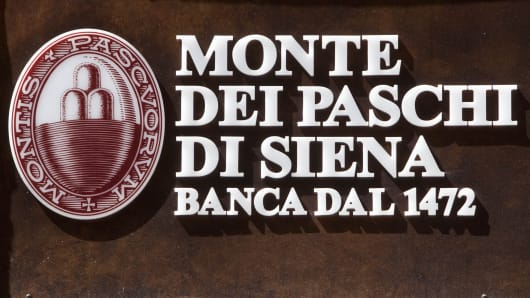Bank of Italy Governor Ignazio Visco called on Saturday for more powers for bank regulators to step in and dismiss bad managers but defended his institution's oversight of the troubled Monte dei Paschi di Siena.
Responding to criticism about banking oversight in the case of the Tuscan lender, Visco repeated that central bank supervisors had acted appropriately but asked for more scope to act in exceptional cases.
"The supervisor should have the power to intervene when - based on solid evidence - it believes it is necessary to oppose the appointment of (bank) executives or to remove them," Visco, who also sits on the European Central Bank governing council, said in a speech to the Assiom-Forex conference in Bergamo.
The comments echoed remarks from ECB President Mario Draghi, who also called for regulators to be able to force out top executives in cases where a bank had run into trouble through the fault of its management.
Monte dei Paschi, Italy's third largest bank, has been at the centre of a financial and political storm over a series of problematic derivatives contracts which has widened into a probe by magistrates into suspected bribery and false accounting.
The Bank of Italy has defended its handling of the scandal, which emerged in the wake of Monte dei Paschi's 9-billion-euro ($12.04 billion) acquisition of smaller rival Antonveneta just before the global financial crisis erupted in 2008.
It has already launched disciplinary proceedings against former management of the bank and could impose fines by next month, Bank of Italy director general Fabrizio Saccomanni told reporters.
Monte dei Paschi's former chief executive Antonio Vigni, who was questioned by magistrates this week, was forced to resign in January 2012 after pressure from the Bank of Italy and former Chairman Giuseppe Mussari stepped down in April 2012.
The central bank has repeatedly defended its handling of the case and detailed a series of steps it took, including inspections of Monte dei Paschi in 2010 and 2011 but it says it has no police-style powers.
Both regulators and the bank's new management said key evidence of problems with one of the opaque derivatives and structured finance trades at the heart of the case was not uncovered until last year.
State Loan "Soon"
After spending the past two weeks scrambling to deal with the scandal, the lender's executives and Italy's central bank are now trying to exit the crisis management phase and expect to clear the way for a 3.9 billion euro state loan package.
The so-called "Monti Bonds", the special instruments through which the loans will be made, are expected to be signed "in a very short time", Monte dei Paschi Chairman Alessandro Profumo told reporters on the sidelines of the conference.
Profumo gave no specific timeframe for the loans, which the bank needs in order to meet new European capital standards, and the European Commission still has to give its final approval to the aid as well as approve the bank's current business plan.
The bank's chief executive, Fabrizio Viola said it was not in talks to restructure the trades dubbed "Santorini" and "Alexandria", two of derivatives trades at the heart of a fraud probe into the former management.
"We will evaluate what to do in the framework of the ordinary management of the bank," he said.
The bank said on Wednesday that losses linked to three problematic derivative trades, including "Santorini" and "Alexandria", totalled 730 million euros.
As the Bank of Italy continued its efforts to clarify its actions regarding Monte dei Paschi, Saccomanni repeated that two securities lending operations in 2011 had been made to help the bank with liquidity strains.
He said the loans, used as collateral to borrow at the European Central Bank refinancing operations, had been repaid and the European Central Bank had been kept fully informed.
He said that there were no other loans of this kind in Italy, but added there were similar lending operations in other euro zone countries.
The Bank of Italy confirmed on Thursday that it had made the special loans to Monte dei Paschi, which faced severe liquidity strains after the euro zone debt crisis in the summer of 2011.


